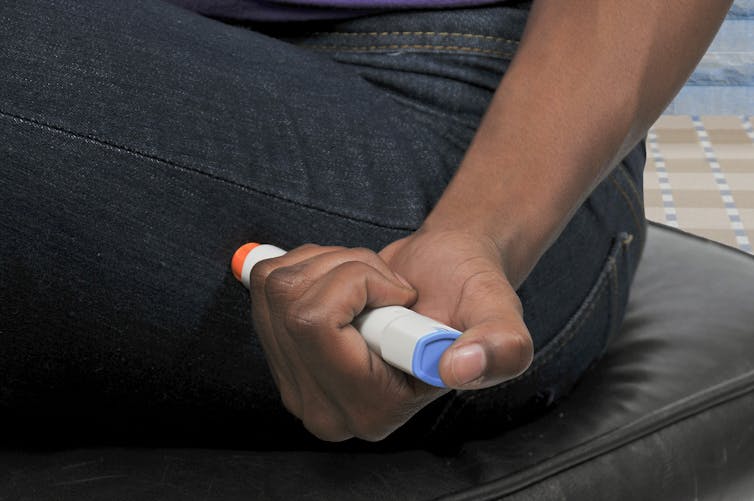New law won't safeguard medicine supply – it'll only ensure we know there's a shortage
- Written by Stephen Carter, Lecturer, Pharmacy Practice, University of Sydney
The Australian government this week passed legislation designed to safeguard access to prescription and essential non-prescription medicines, such as EpiPens, for Australian patients.
The legislation was prompted by a national shortage of EpiPens. They contain adrenaline, a lifesaving medicine needed when patients, such as a child with peanut allergy, have a severe allergic reaction. Despite the public being informed EpiPens would be back on the shelves within a month, the shortage has persisted for almost a year with very limited stocks being available.
In the past, pharmaceutical companies could voluntarily tell Australia’s drug regulator – the Therapeutic Goods Administration (TGA) – if they were expecting shortages of certain medications. But the new legislation mandates companies inform the TGA both of upcoming shortages and any decision to permanently discontinue supply of a medicine. Failure to notify the TGA could have the companies pay a penalty of up to A$210,000.
The new legislation will help prescribers, pharmacists and consumers manage the shortages that arise where companies know there will be shortages. This will improve the frequency of reporting and allow health professionals to think of alternative treatments to manage patients’ ailments, or allow for the importation of medicines from other manufacturers.
However, there is a limit to the effect of this policy. The new legislation is about notification, but it cannot stop medicine shortages altogether.
Read more: Peanut allergy treatment is on the horizon – but don't drop the EpiPen yet
What is in the legislation?
Medicines covered by the legislation are all prescription medicines as well as nominated medicines that can be obtained without prescription, such as EpiPens and Ventolin inhalers.
The new legislation importantly provides a definition of a medicine shortage. This is when the supply of a medicine will not meet the demand of all patients in Australia who take or may take the medicine over the next six months.
Pharmaceutical companies must alert the TGA within two days if they know there’s going to be a shortage of medicine that could have a “critical”, meaning life-threatening, impact on a patient. Nominated critical medicines will be listed on a Medicines Watch List.
 The new legislation was prompted by the recent EpiPen shortage.
from shutterstock.com
The new legislation was prompted by the recent EpiPen shortage.
from shutterstock.com
For shortages of medicines that may have alternatives, or for which the impact would be less severe, the pharmaceutical company has ten days to report the shortage. If the company decides to remove a medicine from the market, they are required to give at least 6-12 months’ notice.
While this has benefits, there may be some unintended consequences. For instance, public notifications of shortages may increase short-term demand and unnecessary personal stockpiling. Notifications will also require extra work for pharmaceutical companies, who may be discouraged from working in Australia’s small market.
The TGA will presumably require extra resources and it is not clear how the Medicines Watch List will be maintained. It is also unclear who decides what medicines are categorised on the list as having a serious or life-threatening impact when unavailable. Finally, the legislation can’t help when shortages occur that are not the responsibility of the pharmaceutical company.
Why do medicines shortages happen?
We may expect developing countries to occasionally have trouble accessing medicines. But it may seem strange to some that a country like Australia would even need this new legislation. Yet, medicines shortages occur worldwide.
The TGA has acknowledged the issue for some time. In 2014, it created a website allowing prescribers, pharmacists and consumers to find out about medicines shortage and provide alerts of what is in short supply and when it is expected to return to the shelves. The site also provides advice for prescribers about alternatives that can be used for those medicines not readily available.
Read more: Why Australia's medicine cabinet is almost bare
But the current alert website isn’t comprehensive. A 2017 survey found a total of 365 different medicine products were reported by pharmacists to be unavailable. But only 15% of these were listed on the TGA website at that time.
Medicines shortages occur for of a multitude of reasons. The medicines supply chain includes sourcing raw ingredients, manufacturing, transport to wholesalers, then pharmacy shelves and finally to consumers’ homes. Since Australia imports nearly all its medicines, shortages can occur because of global issues. Raw material shortages, changes in global ownership arrangements and even natural disasters can affect any part of the supply chain.
 Medicine shortages can happen for a number of reasons.
from shutterstock.com
Medicine shortages can happen for a number of reasons.
from shutterstock.com
Shortages can occur because of unsatisfactory quality of production or storage, especially during transport. Medicines must be stored in a temperature-controlled environment; some needing strictly controlled refrigerated temperatures. In a vast (and warming) country like Australia, this presents considerable challenges. All medicines have a shelf-life and many do not last long at all.
Economic factors also have a role. Modern industries, including the pharmaceutical sector, run on a “last minute” inventory system. Low inventories can also result from public policy. For example, it has been reported shortages for regular medicines increased following the 2012 price disclosure policy which has since dramatically lowered the prices of the majority of medicines subsidised on Australia’s Pharmaceutical Benefits Scheme (PBS).
Some medicines fall out-of-favour, become financially unviable and are discontinued. The new legislation will help us all plan for that.
What can I do?
To help guarantee supply, Australia currently has a National Medical Stockpile. This is a strategic reserve of drugs, vaccines, antidotes and other medicines for use in a public health emergency, which could arise from natural causes or terrorist activities. But this stockpile cannot include all important medicines.
Medicine shortages are a fact and both health providers and consumers have a role in managing the issue. The new notification scheme begins in early 2019. Currently, we recommend health providers maintain ready access to the existing TGA website and that they pro-actively discuss impending shortages with consumers.
Most shortages can be managed by sourcing alternatives. Consumers can help by placing requests for prescription medicines several days in advance of running out. This can allow pharmacists to work-around shortages.
Sometimes this might mean a consumer be asked to use a brand they are not currently using. In Australia, brand substitution can be offered if the TGA has approved that the alternative brand has the same effect. To help with timeliness, many pharmacies also offer prescription reminder services through mobile phone apps.
Read more: Health Check: how do generic medicines compare with the big brands?
Authors: Stephen Carter, Lecturer, Pharmacy Practice, University of Sydney



















